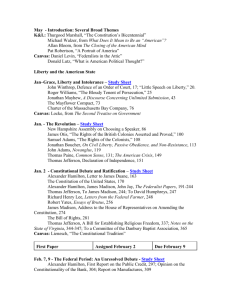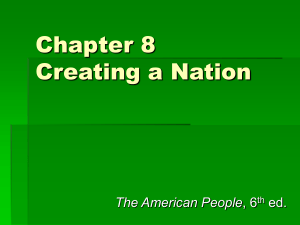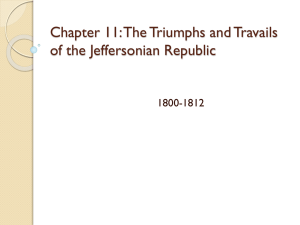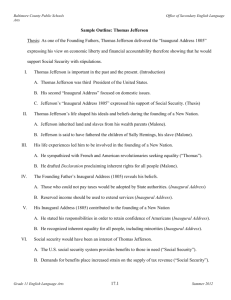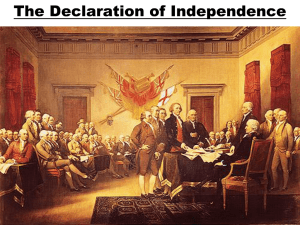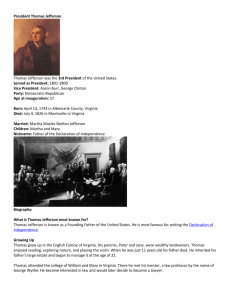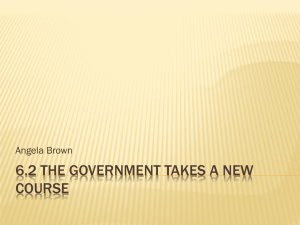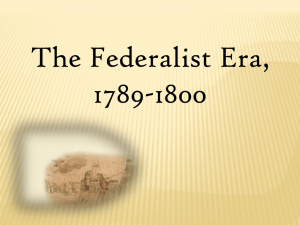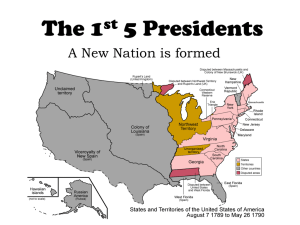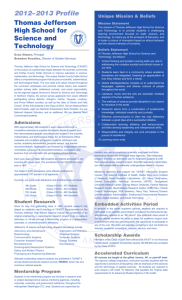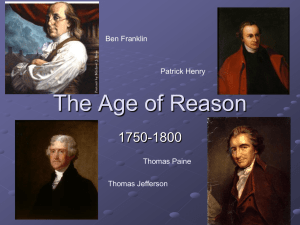PP 15 Revolution of 1800
advertisement
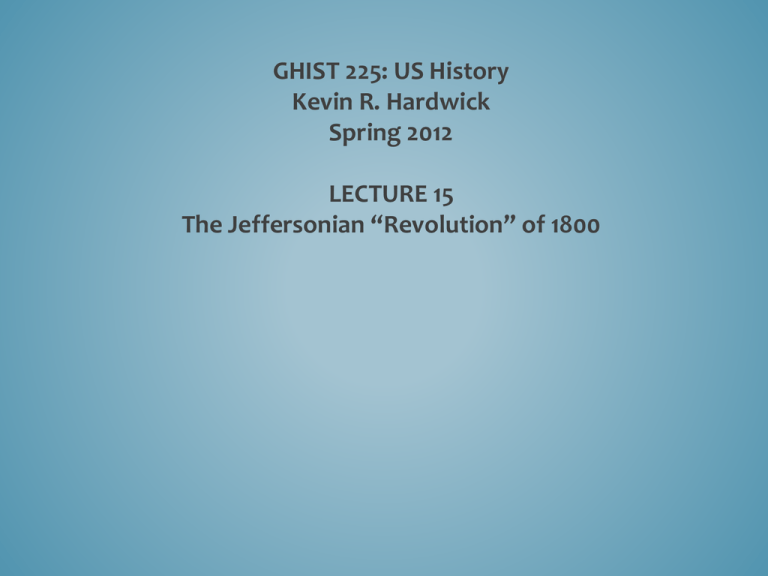
GHIST 225: US History Kevin R. Hardwick Spring 2012 LECTURE 15 The Jeffersonian “Revolution” of 1800 Part I: The Alien and Sedition Acts and the Virginia and Kentucky Resolutions Part II: Jeffersonian Republicanism 1800: Madison’s Report on the Virginia Resolutions 1800: The “Revolution of 1800” ________________________________________________________________ 1798: Alien and Sedition Acts 1798: Virginia and Kentucky Resolutions 1801: Jefferson’s First Inaugural Address Alexander Addison, a Federalist judge on Pennsylvania's fifth circuit: "Liberty without limit is licentiousness, it is the worst kind of tyranny." "The exercise of those faculties of opinion . . . must be limited, so that it never represents a solemn truth or exercise of religion as false or ridiculous, an established and useful principle or form of government as odious and detestable; a regular or salutary act or motive of the authorities as unlawful or pernicious; or an upright man as corrupt." James Madison, “Report on the Virginia Resolutions”: The Constitution was submitted to the “States”: In that sense the “States” ratified it; and in that sense of the term “States,” they are consequently parties to the compact from which the powers of the Federal Government result. [CAPCT, Vol. 1, p. 677] James Madison, “Report on the Virginia Resolutions”: The states then being the parties to the constitutional compact, and in their sovereign capacity, it follows of necessity, that there can be no tribunal above their authority, to decide in the last resort, whether the compact made by them be violated; and consequently that as the parties to it, they must themselves decide in the last resort, such questions as may be of sufficient magnitude to require their interposition. [CAPCT, Vol. 1, p. 678] John Adams to Thomas Jefferson, 9 July 1813: “But who are these "aristoi"? Who shall judge? Who shall select these choice Spirits from the rest of the Congregation? Themselves? We must first find out and determine who themselves are. Shall the congregation choose?” John Adams to Thomas Jefferson, 2 Sept. 1813: “The five Pillars of Aristocracy, are Beauty Wealth, Birth, Genius and Virtues. Any one of the three first, can at any time over bear any one or both of the two last.” Thomas Jefferson to John Adams, 28 October 1813: “I think the best remedy is exactly that provided by all our constitutions, to leave to the citizens the free election and separation of the aristoi from the pseudo-aristoi, of the wheat from the chaff. In general they will elect the real good and wise. In some instances, wealth may corrupt, and birth blind them; but not in sufficient degree to endanger the society.” James Monroe, first inaugural address , 1817: “While, then, [the people] retain [their] present sound and healthful state everything will be safe. They will choose competent and faithful representatives for every department. It is only when the people become ignorant and corrupt . . . that they are incapable of exercising the sovereignty.” Thomas Jefferson, first inaugural address , 1801: "We are all Republicans--we are all Federalists." "If there be any among us who would wish to dissolve this Union or to change its republican form, let them stand undisturbed as monuments of the safety with which error of opinion may be tolerated where reason is left free to combat it." Thomas Jefferson, first inaugural address , 1801: "I know, indeed, that some honest men fear that a republican government cannot be strong; that this government is not strong enough. . . . Sometimes it is said that man cannot be trusted with the government of himself. Can he, then, be trusted with the government of others? Or have we found angels in the form of kings to govern him? Let history answer this question." Peter Porter, Speech on Internal Improvement, Feb. 1810: I have the honor to represent a portion of the country which is perhaps as little affected by our exterior commercial relations as any part of the United States. The great evil, and it is a serious one indeed Sir, under which the inhabitants of the western country labor, arises from a want of a market. There is no place where the great staple articles for the use of civilized life can be produced in greater abundance or with greater ease; and yet as respects most of the luxuries and many of the conveniences of life the people are poor. They have no vent for their produce at home; because, all being agriculturalists, they produce alike the same articles with the same facility; and such is the present difficulty and expense of transporting their produce to an Atlantic port, that little benefits are realized from that quarter. Peter Porter, Speech on Internal Improvement, Feb. 1810: The single circumstance, of the want of a market, is already beginning to produce the most disastrous effects, not only on the industry, but upon the morals of the people. Such is the fertility of their lands, that one half of their time spent in labor, is sufficient to produce every article which their farms are capable of yielding, in sufficient quantities for their own consumption, and there is nothing to incite them to produce more. They are, therefore, naturally led to spend the other part of their time in idleness and dissipation.
